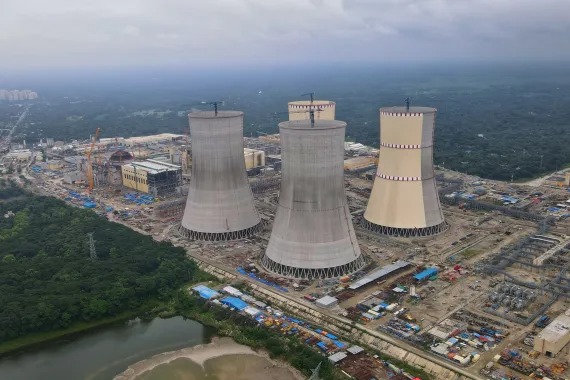In a momentous occasion that marks a significant step in Bangladesh’s quest for energy self-sufficiency, the South Asian nation has received its inaugural shipment of uranium fuel from Russia. This historic development catapults Bangladesh into the ranks of nations harnessing nuclear energy, becoming the 33rd country globally to do so. This remarkable achievement is part of a colossal $12.65 billion project to construct Bangladesh’s maiden nuclear power plant in Rooppur, a venture in which Russia is providing substantial financial backing, covering 90 percent of the project costs. As this pivotal event unfolded, Prime Minister Sheikh Hasina and Russian President Vladimir Putin engaged in a virtual ceremony hailed as the “nuclear fuel delivery ceremony.” Amidst the jubilation, it was evident that Bangladesh is now on the brink of a transformative energy era.
A Landmark Partnership with Russia
The journey towards Bangladesh’s nuclear aspirations has been characterized by a strong collaboration with Russia. This venture, driven by Russian state-owned atomic company Rosatom, has been facilitated by a substantial loan from Russia. The loan, repayable over 28 years with a generous 10-year grace period, underscores the depth of Moscow’s commitment to this ambitious project. The strategic partnership between Bangladesh and Russia, sealed by a bilateral agreement in 2011, has laid the groundwork for this remarkable achievement, marking a significant milestone in both nations’ diplomatic and technological endeavors.
Overcoming Challenges: Pandemic and Sanctions
The path to completing the Rooppur nuclear plant has not been without its share of obstacles. Delays, particularly attributed to the COVID-19 pandemic’s constraints on construction, have necessitated several revisions to the project’s timeline. Furthermore, the imposition of sanctions on Moscow following its invasion of Ukraine added an extra layer of complexity. Originally slated to begin operations in July of the upcoming year, the first unit of the plant has now experienced setbacks. Nonetheless, Russia, through its Foreign Minister Sergei Lavrov, recently assured Bangladesh of its unwavering commitment to timely project completion, even in the face of Western sanctions. This declaration underlines the resilience of this groundbreaking collaboration.
A Vision for Energy Security
As Russia’s state news agency TASS reported, the Rooppur nuclear power plant’s design and construction fall under the purview of Rosatom’s engineering division. This state-of-the-art facility boasts a remarkable life cycle of 60 years, with the possibility of extending its operations for an additional 20 years. Moreover, a significant proportion of the approximately 2,000 personnel required to operate the plant once it is fully operational will receive training in Russia, emphasizing the capacity-building aspect of this partnership. For Bangladesh, this nuclear power plant signifies a lifeline to address its crippling electricity crisis, driven by erratic weather patterns and economic challenges, including dwindling foreign currency reserves and a weakened national currency. The facility promises to reduce the nation’s dependence on costly imported gas, a dependency exacerbated by surging gas prices in the wake of the Russian-Ukraine conflict.
In sum, the delivery of the first uranium shipment from Russia to Bangladesh’s burgeoning nuclear power plant is a momentous achievement that holds the promise of transforming the nation’s energy landscape. As the Rooppur project navigates the challenges ahead, Bangladesh can look forward to a brighter, more energy-secure future, while its partnership with Russia serves as a testament to international collaboration in the pursuit of sustainable energy solutions.















